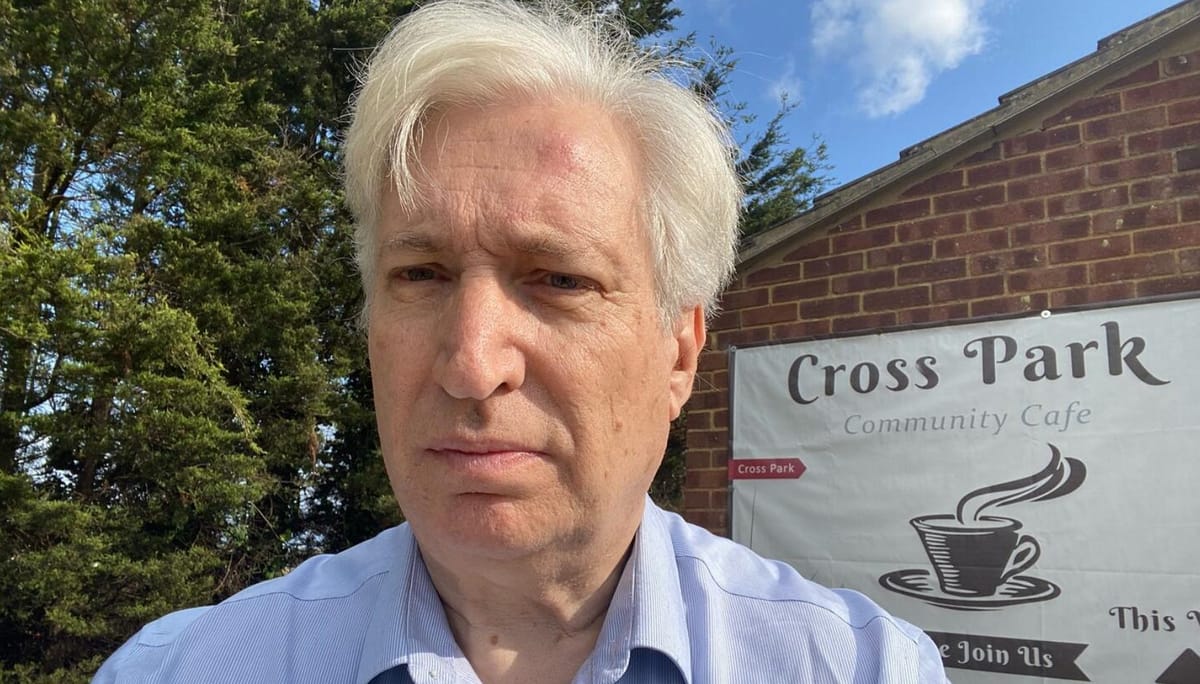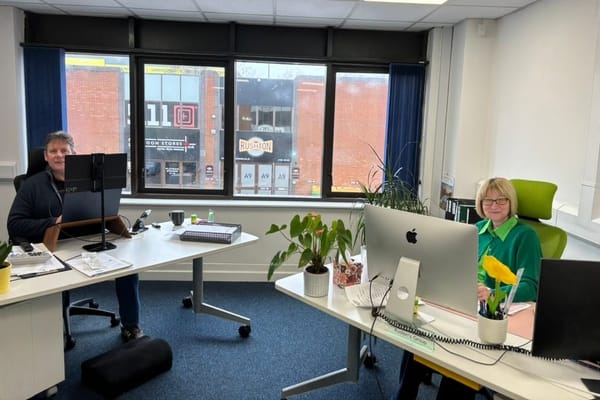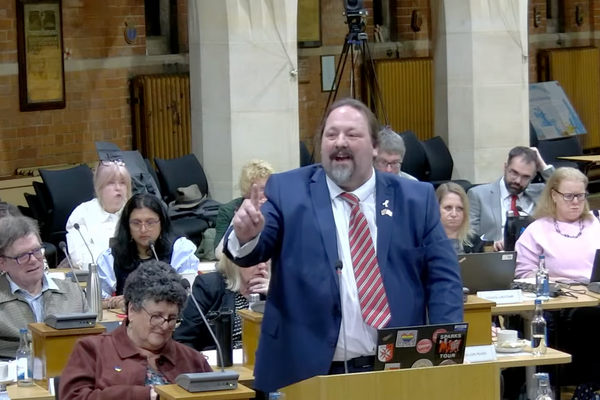“A parish councillor is sometimes expected to do more than a unitary authority councillor”
What Steven asked Chris Fribbins, the parish clerk for Allhallows and Halling

For today’s Sunday interview, Steven continues his tour of the more far-flung parts of Medway. Chris Fribbins has been a Medway councillor and parish councillor and is currently a parish clerk for both Allhallows and Halling. They met in a pub in the latter to discuss the different work parish councils do, the effect of having a neighbourhood plan, and, of course, the Housing Infrastructure Fund.

Where were you born?
Romford in Essex.
How did you end up in the Medway Towns?
Lloyds of London moved into what is now the headquarters for the unitary authority. They relocated staff from various locations down to Chatham.
What jobs did your parents do growing up?
My mother did various part-time jobs in the market. My father, who I didn't really know that well, was involved in print and then moved down to Cornwall.
How did you find school and university?
Generally, I did better in primary than the grammar school I attended in Essex, but if I could go back and do it again, I’d do it differently. They don't give you the context with teaching at school to do with real life and other things that probably would have been useful.
What was your first full-time job?
Computer operations in Barclays Bank in the 1970s. That was an early time for computers. It’s amazing the difference between those computers now and then. The huge boxes we had with very little memory and computing power.
What is your official occupation?
I suppose technically I’m retired. I am a pensioner now, but I do have two part-time jobs. One as clerk of Allhallows Parish Council and one as clerk of Halling Parish Council. They are the paying jobs.
What is a parish clerk?
Technically there are two roles. Some parish councils do this under one person. One is called the Proper Officer, which is like a legal officer, who tends to ensure that the administration is carried out correctly with the rules and regulations. The other tends to be a Treasurer role, handling the accounts and the payments and things like that. A lot of parishes have just one person who does both roles, with different time allocations. There are ranges of some parish councils have very limited part-time roles, and some councils like Cuxton have a full-time clerk.
What does the average day entail?
A lot of my work is from home. Allhallows Parish Council work I do tend to do from home unless I have to go up there. Halling there is an office in the community centre, and Cliffe and Cliffe Woods were from home as well. I have a table with three computers open most of the time to run the different things. It is definitely not that every day is the same. There's a lot of issues at all parishes that need to be addressed, one way or another.
What additional roles, paid or unpaid, do you do?
Where do we start the list? I volunteer with the Dickens Country Protection Society. I am involved with an organisation called Railfuture which represents rail use across the country. I’ve been involved with that since 2013, held various roles in that, and I help to organise the Kent division of that. I’m involved in a number of community associations. The Cliffe Woods Association as a trustee and the Allhallows Cross Park Association as a trustee. We try to get more people involved and to help out there. Also, the Kent Community Rail Partnership, which I chair.
What is it about the rail in the area that you have got so involved in?
I mean the lines that Community Rail started to support were generally the quieter branch lines rather than the main lines. It started off with the Sittingbourne to Sheerness line, and just a few stations. Then it grew to the Medway Valley line, Strood down to Paddock Wood, and later extended to Tonbridge. In the last couple of years, we've also taken on the line through to Maidstone East.
What is it you do?
We work with local communities, put on events, maybe improve the station, and liaise with the operator.
What were your thoughts on the planned line out to Hoo?
I contacted Medway Council very early on about the public transport offering for the peninsula. If they were to continue with their aim of building that many houses, they were still reliant on one roundabout at the bottom of Four Elms Hill, and all the traffic was really going through there. So I was talking to Medway Council at the time and saying something's got to be done. There is a railway there, it runs to the other side of Hoo, and it's a freight line. It could be converted to run some sort of passenger trains. It probably would need a branch extending round to Strood, rather than Gravesend, if it was to be really effective. The money that was put aside by the government, the HIF (Housing Infrastructure Fund) bid was certainly plenty to cover it. Pre-covid, it was a good amount of money for the railway and the road.
But then on top of that, there were cultural parks and things like that added in. It took a long time to get things moving. A technical issue is that that line was not electrified, so it would be diesel without electrics. They got permission to do third rails like the rest of the Southeastern area, but it came with new technical constraints. You couldn't run a third rail unless you put in overpasses, pedestrian bridges and vehicle bridges. There's a few public rights of way. There aren't any roads that cross it, but there are a few farm tracks to the barns. You would have to put in a bridge for that. They said turning left at Hoo junction and heading for Strood was too tight a junction and they weren't encouraging that, so gradually things got more expensive and then covid came in and inflation took hold.
I’m disappointed that we haven't progressed it, but there is probably an opportunity coming up in a few years’ time when Southeastern replace some of their trains. You can run it down the line from Charing Cross or Cannon Street through Gravesend, and then run on battery through to Hoo station. I’ll always be keen on a public transport solution and unfortunately the idea of trying to run buses on the current road network just can't cope unless you give them priority. How are you going to give them priority? Busses give you flexibility, but we are just too heavily congested through Strood. The idea of promising people a frequent bus service to Strood sounds good on paper, but in practice is very different.
Is there no chance of a train line that connects Hoo to Medway stations?
I don't think it's completely out of the question, but the studies show it's difficult because the bend is very sharp. Of course, the big issue was that people didn’t want the HIF bid because they thought that that was generating the housing, where actually it’s the other way round. The housing is coming, and has been allocated, unless a new Local Plan comes in and says they have found somewhere else to put all these houses.
Is it possible to have the money for the infrastructure and the roads, and not have the extra housing?
It started off like that. It was supposed to be for, bringing housing forward and potentially some additional housing, but I think Medway just didn’t handle it very well, to be honest. All of the environmental land is protected. They aren’t going to build there, or impact those areas. That does still leave some areas to be developed if they are developed properly. That’s why I was doing a local Neighbourhood Plan for the Cliffe and Cliffe Woods area. It would be nice not to have it, but there is a need for housing which is local housing rather than expensive housing, for people travelling from afar. That brought a lot of people onto the peninsula in the first place, moving into a countryside area like that. I don’t like to say ‘Pull up the drawbridge’ once you’ve got your nice house so no one else can move in. The worry is we are not getting the housing without the infrastructure.




